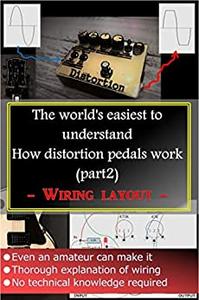
Free Download The world’s easiest to understand How distortion pedals work (part2): Explanation of wiring layout by lenheyvan
English | 2022 | ISBN: N/A | ASIN: B0BH3BPQLD | 119 pages | EPUB | 1.11 Mb
In this document, "The World’s Most Easy-to-Understand Distortion Effectors (Part 2) – Explanation of Wiring Layout", we will explain the wiring layout of distortion effectors.
In "The World’s Easiest-to-Understand Strain Effectors (Part 1) – Explanation of Electronic Circuits", we explained the electronic circuits, and assuming you have that knowledge, we will explain the wiring layout, so please read Part 1 and Part 2 in that order.
This book is for guitarists who "don’t really understand how effectors work, but want to create their own best distortion sound.
However, we will not talk about anything more difficult than necessary.
This is because the goal is to understand how distortion effector circuits work, and to be able to create something equivalent yourself.
You may have understood how effector circuits work in the previous part, but the hurdle to making your own effectors is how to wire them up.
Now that you understand the theory, how do you actually build it?
First of all, you don’t know the specifications of each part (footswitch, volume pot, etc.), so you have to start by looking them up.
Once you understand what each terminal means, you then need to know how it should be wired.
There are three jack terminals, how should I wire them?
Where should the knobs that adjust gain and volume be wired from and to what terminals on the volume pot?
How do I achieve true bypass?
etc…
If you try to do these things from scratch while researching on the Internet, your mind will fail you before you even get started.
This book is for those people.
In this book, I will carefully explain how to use each component, the role of the terminals, and even how to wire inside the case.
When I started to make my own effectors, there was no book that explained the meaning of each part of the circuit (resistors, capacitors, etc.), how to use switches and other components, and how to wire them in an easy-to-understand manner for the layman.
Therefore, I learned by researching one by one on the Internet, but it took me a long time to understand the principle of operation and to be able to make my own effectors.
So I decided to document the knowledge I had gained so far.
If you do it yourself, you can make adjustments over and over again until you are satisfied, and most importantly, it is free no matter how many times you do it.
If you have an effects pedal that interests you, but you don’t have the money! If you have an effects pedal that you like but don’t have the money, you can try making it yourself, or you can modify it to suit your own needs.
The effect pedals that you have modified are your own original effect pedals.
In this day and age, it has become very easy for individuals to sell their own products, so you can make your own original effects pedals and sell them on the Internet.
This fun world is right around the corner from you.
Until now, I thought that effectors were made by people with expertise because such information was not available nearby, but recently the number of people making their own effectors has been increasing.
I think this is because people who make their own effectors transmit information on the Internet, people who see them become interested in them, and people who are fascinated by the fun of making them start transmitting information again.
I am one such person.
However, as mentioned above, I feel that the threshold is still high, which is why I am writing this book.
By lowering the threshold to the world of self-made effectors through this book, I hope to create a fun world where guitarists can create their ideal sounds while modifying and making their own effectors as a matter of course.
